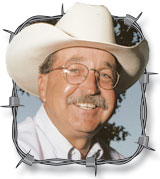As a child, I can remember that most of my little friends dreamed of growing up to be firemen, policemen, soldiers, or professional baseball players. Even then, I was a little odd, because I thought the ideal job would be that of the farm broadcaster that provided the afternoon market reports on the big radio station we listened to religiously. At that early age, I could sense that the information he provided was important to my family and thus, must be pretty important himself.
I would often steal away to my room with a copy of the latest farm magazine which always had last week’s or last month’s market report and pretend that I was the guy on the radio with the booming baritone voice. As professionally as possible for an 8-year-old to sound, I’d try to read the prices and classifications as quickly and as clearly as that guy… “Corn at Kansas City traded up three cents to a dollar and a dime (remember how old I am) per bushel. Wheat was off slightly, down a penny to a $1.35. Fat cattle stayed steady at $18 to $20 and pork bellies remained unchanged.” Yep, it all seemed easy enough.
While I and most of my friends vacillated back and forth on career choices for the next 10 years, that gig of reading the market reports always remained in the back room of my mostly vacant mind. Visiting with my newly assigned academic advisor during my first year at the university, I can remember him asking me, “Jerry, what would you like to be doing four years from now?”
“I think I’d like to be a farm broadcaster on the radio.”
There were a few seconds of awkward silence until he stated, “Well, you’ve certainly got the face for radio, but you’ll have to lose that accent to get a job.”
Accent? What accent? It was the first time in my life that I’d been far enough away from home to realize it was me instead of everyone else who talked funny. So, that shocking discovery, coupled with the reality that I would have to take as many English and writing courses as agriculture courses, helped me decide to become a vocational agriculture teacher instead. I never regretted my decision, but some little part of me still wanted to read the market reports into a microphone.
Earlier this summer, while I was baling hay one afternoon, my cell phone rang. The caller ID on the screen was an unfamiliar number, but the locator indicated the call was from Nashville, Tenn. Assuming it was a telemarketer; I hit the ‘decline the call’ button and continued baling hay. I know lots of people who live in Nashville, but I’m pretty sure none of them know me. However, a few minutes later my phone indicated I had a message waiting.
The message was from an individual requesting me to be the banquet speaker at the national convention of the National Association of Farm Broadcasters this fall. I was flattered to be asked and, of course, told her I would be more than happy to do so.
“How much do you charge?” she asked.
“Oh, if one of your members will just let me do the afternoon market report from the convention, using my own accent, we’ll just call it even.”
Jerry Crownover farms in Lawrence County. He is a former professor of Agriculture Education at Missouri State University, and is an author and professional speaker. To contact Jerry, go to ozarksfn.com and click on ‘Contact Us.’







